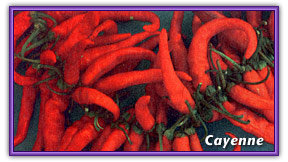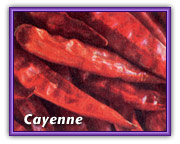 Source
Source
Cayenne is the pungent dried fruit of a highly variable species in the nightshade family that also gives us paprika, bell peppers, and jalapenos. [C. frutescens also produces hot peppers that are used medicinally.] Cayenne originates in the tropical Americas and is grown worldwide.
Traditional Use
The ancient Maya used cayenne to treat mouth sores and inflamed gums. Herbal use as a stimulant began with Samuel Thomson (1769-1843), who used it to "produce a strong heat in the body" and "restore digestive powers". In the 1970s John Christopher promoted cayenne as a circulatory stimulant, claiming that "it feeds the necessary elements into the cell structure of the arteries, veins and capillaries so that these regain the elasticity of youth again, and the blood pressure adjusts itself to normal."
 Current Status
Current Status
The popular belief that cayenne stimulates digestion and circulation has no scientific proof; in Germany, therefore, cayenne products are not permitted to carry claims about stimulating digestion or circulation. It does, however, contain carotenoids and vitamins C and E; these antioxidants protect against free radicals, oxygen compounds that can damage cell membranes and disturb metabolic pathways. Consumption of carotenoids is associated with a reduced risk of cancer and enhances the activity of various immunesystem cells. The carotenoids in red peppers have been shown clinically to improve lifespan in primates.
Capsaicin, the source of cayenne's bite, is used in minute amounts in topical pharmaceutical products to treat pain at the site of an apparently healed infection, rheumatoid and osteoarthritis, and shingles. (The whole herb itself is not used in this way.)
Preparations
Cayenne is available fresh or as whole dried fruit, dried powdered fruit, and in capsules, tablets, and tinctures. Both over-the-counter and prescription ointments and creams containing capsaicin are prescribed by physicians. The concentration of capsaicin in topical preparations is typically 0.025 to 0.075 percent. Topical products should be used under a physician's direction.
Cautions
Cayenne's pungent principle, capsaicin, is a highly toxic irritant in its pure form. Capsaicin is not water soluble, so it is difficult to wash it off one's hands after handling hot peppers. Scientists working with capsaicin protect themselves with space suit-like garb. Handling hot peppers can cause burning skin irritation, a condition called "Hunan hand" from the spicy cuisine of Hunan, China.
Actions
Antioxidant
Nutritive

![]()
![]()
![]()
 Source
Source Current Status
Current Status